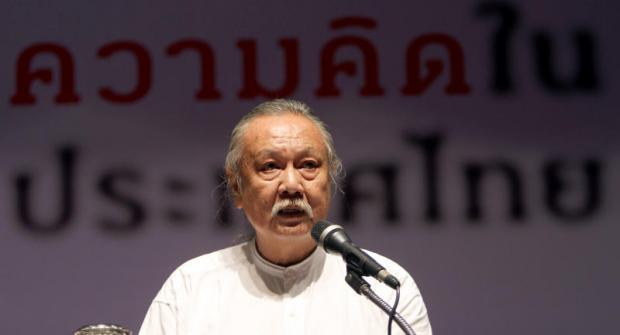
Adopting a discourse involving "good people" and "bad people" to justify the acquisition of political power and control of the political spectrum will bring the country to its knees, a renowned social thinker and political scientist said on Friday.
Such terminology, which was used ubiquitously during the anti-government protests and 2014 coup, has continued to dominate mainstream thinking and is detrimental to the progress of Thai politics, said Seksan Prasertkul.
In an address about the future of Thai society at the Faculty of Economics of Thammasat University, the well-known former student leader and revolutionary said the concept of separating "good people" from "bad people" in absolute terms was used to justify the coup and has often been a tool used to dehumanise people who hold different opinions.
"At that time, many mob leaders talked about this, and some went as far as to say that people are not equal and that political power should only be in the hands of 'good people' and that 'bad people' should not be involved in politics," he said.
Mr Seksan argued that this attitude is born of social conditioning. In this case, "good people" are those who are well-to-do and highly educated while "bad people" are those who live in rural areas or middle and lower-class urban areas who usually are less educated and have lower incomes.
Those who are branded as so-called "bad people", Mr Seksan said, include democratically elected MPs and the people who elected them -- or millions of people from across the nation.
And when those "good people connect with conservatives, most of whom are elites who control the state mechanism, they can together manipulate the rules to control those 'bad people' without allowing their participation in a democratic process".
In the past, the country relied on an election to choose the political leader, said Mr Seksan, but these days, some groups of people say that does not work and the system should be amended to ensure that only "good people" can have authority over the nation.
It can be inferred that the front line of the "good people" in this context are bureaucrats, major business groups and upper middle class people while "bad people" are politicians and their voters, he said.
Still, Mr Seksan admitted that the failure of politicians to inspire either trust or loyalty has paved the way for this chacterisation to emerge.
He said there are three key areas where politicians and elected governments have failed. They are in the decentralisation of power, bureaucratic reforms and bringing more participation of the people in the legislative process.
In addition, several democratic governments have seen the movements of civic groups as threatening and tended to want to control and curtail them, rather than court their opinions on matters of policy, he added.
Mr Seksan pointed out that in Thailand ideological conflict is similar to religious conflict: Belief and faith in Thai society have become a "contested area" between conservatives and liberals, with the conservatives currently holding the upper hand.
He said that the conflict that has been at the core of Thai society for over 10 years is ideological and it is one of the factors that has rendered reconciliation efforts difficult.
He stressed that people from all walks of life need to have a space reserved for them in politics and that a handful of people should not be the sole group who has the power to determine a political system suitable for 21st-century Thailand.
Furthermore, Mr Seksan cited "Thainess" as another problematic idea that is used to create conflicts. He said Thainess has been used to justify and support authoritarianism, especially after the coup in 2014.
In recent years, the Thainess of people who hold opinions that are not in line with those of the states is often questioned. Moreover, people who call for democracy and human rights are branded as being outside of, or not understanding, Thainess and are marginalised or chased out of the country.
He noted that Thai democracy is weak because elected power holders failed to decentralise power to the local areas in the past.
Acting deputy spokesperson of the Pheu Thai Party Anusorn Eiamsaard said although he generally agrees with Mr Seksan's analysis, he does not want the public to be too quick to judge one way or the other, as other angles and perspectives must be taken into consideration as well.
He added that he wants the public to examine problems comprehensively and systematically and come to their own conclusions, rather than jump to accept what Mr Seksan said.
He also noted that the use of specific methods of discourse to disparage opponents is a thing of the past and also much harder to achieve in the age of social media.
Assistant Professor Wanwichit Boonprong of the Faculty of Political Science, Rangsit University, said he agrees with Mr Seksan that too much talk of "good people" and "bad people" has contributed to the stagnation of Thai politics and has been used too frequently to stifle constructive debate.
"The creators of such discourses are usually those who are close to the centre of power, in this case the elites such as civil servants. These elites feel threatened if other groups who hold different opinions attempt to disrupt their share of power." he said.